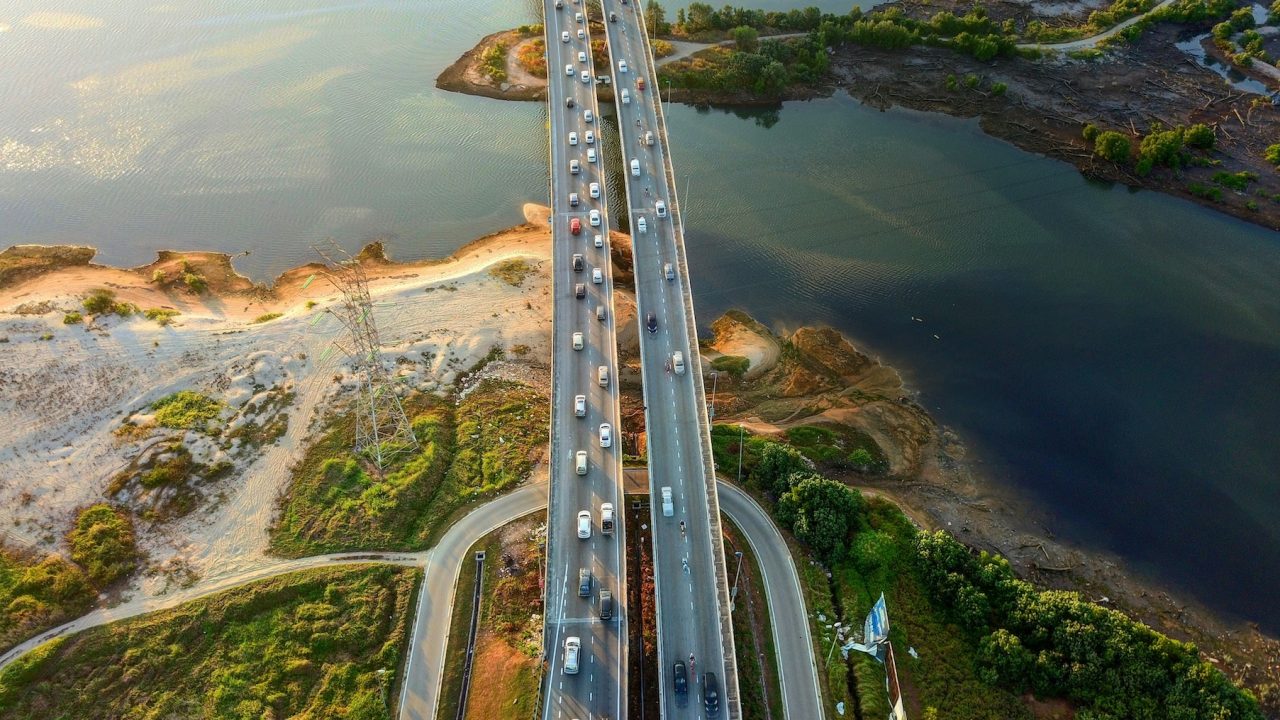In this era of hyperconnectivity, the “always-on” culture — driven by round-the-clock social media activity, continuous digital engagement, and incessant mobile phone notifications — has resulted in significant mental and environmental costs. Environmentally, the impact stems from energy-intensive data centres, growing electronic waste (e-waste) from rapidly obsolete smartphones, and the hidden carbon footprint of online platforms. Psychologically, the toll includes mobile addiction, emotional distress, and depression related to social media — issues especially prevalent in Malaysia, where 88% of the population is online. Frugal innovation, with its emphasis on efficiency and sustainability through “doing more with less,” offers a way forward. It encourages the development of longer-lasting mobile devices, less addictive algorithm designs, and greener digital infrastructure, paving the way for a more sustainable, people-centric digital future.
Green light, red lines
Johor, Southeast Asia’s leading data centre market, is taking a measured approach to rapid expansion. In 2024, the state rejected nearly 30% of new applications over water and energy concerns — a clear shift toward stricter sustainability standards. As hyperscale demand grows, Johor’s selective stance sets a regional precedent for balancing digital growth with environmental limits.
Photo: Unsplash / Afifi Zulkifle
THE ENVIRONMENTAL IMPACT OF DIGITAL INFRASTRUCTURE
The exponential growth of digital technologies has led to higher energy consumption and generated more e-waste. Data centres alone consume about 1% of global electricity — a figure expected to rise further with the growing demands of online streaming, blockchain, and artificial intelligence.1 In Malaysia, the rapid adoption of digital services and smartphones has further accelerated e-waste generation, with an underdeveloped recycling infrastructure worsening the problem.2
The manufacturing of digital technology is heavily dependent upon conflict minerals like cobalt, lithium, and rare earth elements, which are often extracted from regions plagued by human rights violations and environmental degradation.3 4 Current research indicates that unless sustainable material substitutes and more responsible sourcing practices are developed, both the environmental and humanitarian costs of global digital consumption will continue to rise.5 6
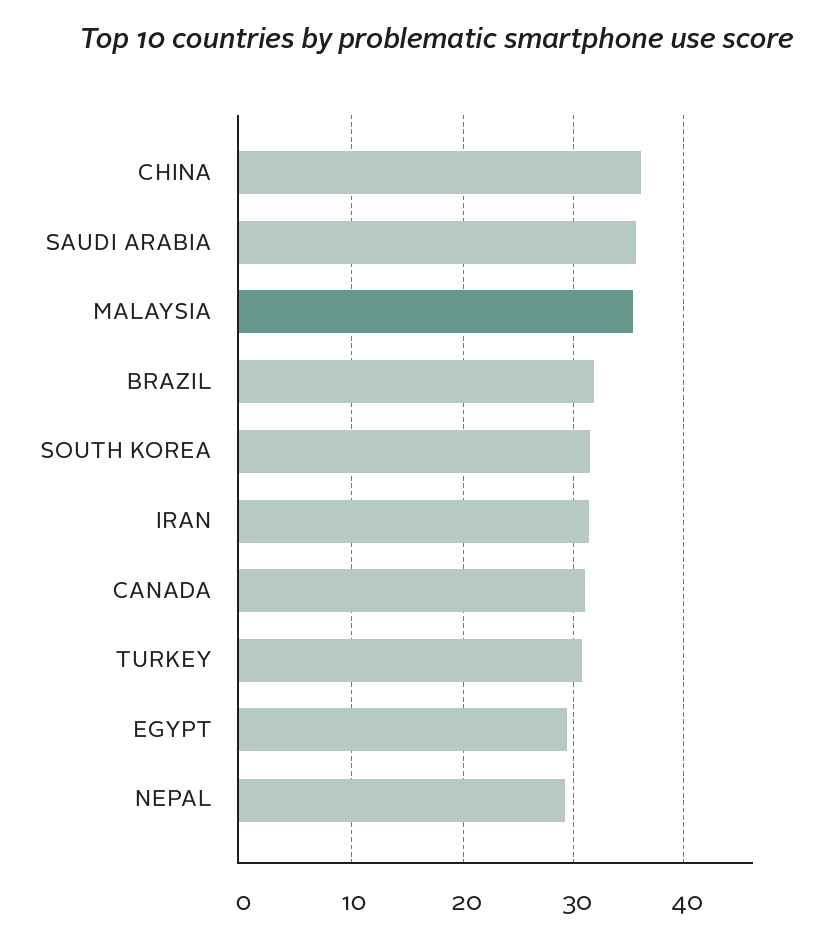
Malaysia among top 3 in problematic smartphone use
Problematic smartphone use (PSU) — excessive, compulsive use disrupting daily life — is a growing global concern. A McGill University meta-analysis (2014–2020) using the Smartphone Addiction Scale ranked Malaysia third (35.43/60) among 24 countries, after China and Saudi Arabia. This highlights Malaysia’s high smartphone dependence and its potential impact on mental health, sleep, and social well-being.
Source: McGill University meta-analysis (2014–2020), via Demandsage
THE PSYCHOLOGICAL IMPACT OF DIGITAL ADDICTION ON MALAYSIAN YOUTH
The psychological impact of digital overuse is particularly evident among university students. Studies show that over 80% of secondary school students exhibit signs of mobile phone overuse, such as anxiety, sleep deprivation, and a decline in academic performance.7 Late-night screen time further disrupts sleep patterns, with many students sacrificing rest to continue scrolling through social media.8
Research has shown a staggering 93% increase in social media use in Malaysia, with users spending between 5 and 12 hours online each day being more prone to loneliness, low self-esteem, and online bullying.9 This surge in usage was most pronounced during the COVID-19 pandemic, when social media became an essential tool for communication and information sharing.10
A tragic incident in Sarawak, where a 14-year-old girl took her own life after engaging in an Instagram poll, highlights the potentially devastating consequences of unregulated digital spaces.11
Research has shown a staggering 93% increase in social media use in Malaysia, with users spending between 5 and 12 hours online each day being more prone to loneliness, low self-esteem, and online bullying.
FRUGAL DIGITAL INNOVATION: A SUSTAINABLE PATHWAY FORWARD
In response to the ethical, environmental, and psychological challenges posed by excessive digital consumption, Malaysia must adopt a frugal digital sustainability plan — an integrated approach that aligns technological advancements with resource conservation, ethical manufacturing, and psychological well-being. The following provides an outline of key strategies based on current knowledge and observations:
1. Digital Literacy and Well-being Education
Empower students and the broader public with critical awareness of their digital consumption habits.
Universities and teacher training institutions should incorporate media literacy into their curricula, equipping students to recognise algorithmic manipulation, addictive design features — such as infinite scrolling and push notifications — and misinformation.12 Currently, few adults fully understand how social media algorithms exploit psychological vulnerabilities. Workshops can help parents and teachers guide younger users towards healthier digital behaviours. NGOs and government agencies should also run sustained public awareness campaigns (eg, Malaysia’s “Kempen Bijak Internet”) to promote responsible technology usage. A digitally literate population will be better protected against disinformation, compulsive usage, and the mental health risks associated with social media.
2. Modular and Durable Device Design
Reduce e-waste by shifting away from disposable gadgets toward repairable, upgradeable, and durable devices.
Right-to-Repair Policies can encourage or mandate technology companies to design modular phones and computers with replaceable batteries, screens, and components.13 Partnerships with manufacturers (eg, Samsung, Xiaomi) could support trade-in rebate programmes for used devices and provide incentives for responsible e-waste recycling. The government should also promote local repair ecosystems by supporting small businesses and repair shops that extend the lifespan of electronic devices. This initiative would reduce the number of prematurely discarded devices and help lower Malaysia’s contribution to the 53.6 million metric Malaysia among top 3 in problematic smartphone use tonnes of annual global e-waste. 14
Right-to-Repair Policies can encourage or mandate technology companies to design modular phones and computers with replaceable batteries, screens, and components.
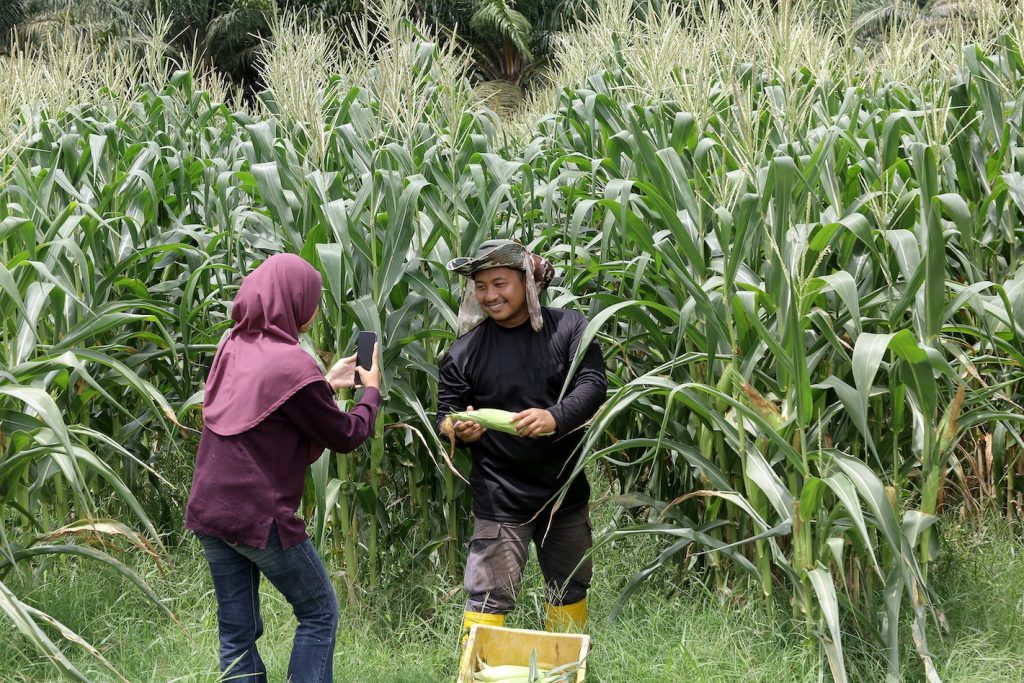
Closing the last mile
JENDELA tackles Malaysia’s “last mile” challenge — the final, often most difficult and costly step in delivering reliable internet to home in rural and remote areas. Phase 1 expanded 4G coverage to 96.92% of populated areas and upgraded 3.8 million premises with fibre access. By focusing on underserved communities, the initiative ensures digital inclusion is a right for every Malaysian.
Photo: iStock / Alex Liew
3. Energy-Efficient and Low-Bandwidth Solutions
Ensure that rural and low-income communities can access digital services without incurring prohibitively high energy or data costs.
Developers should be encouraged to create low-data-usage versions of essential apps (eg, those for banking, education) for areas with limited connectivity. They should also adopt Offline-First App Design, where applications function without constant internet access by offering features like downloadable learning content and offline transaction capabilities. In addition, Malaysia’s technology parks should transition to renewable-powered servers to minimise energy consumption through green data centres.15 These efforts will help narrow the digital divide while lowering the carbon footprint associated with data transfer.
4. Ethical Digital Interface Design
Curb social networking addiction by prioritising individual well-being over corporate profits.
Tech companies should adopt Human-Centred Design principles that remove manipulative features (eg, infinite feeds, auto-play videos) and instead incorporate usage dashboards, mandatory breaks, and notification limits.16 The Malaysian Communications and Multimedia Commission (MCMC) can introduce regulations requiring platforms like Facebook and TikTok to disclose their engagement tactics and provide “minimalist mode” options. Additionally, the government should support ethical alternatives and promote local apps that prioritise privacy, mental health, and mindful digital use.
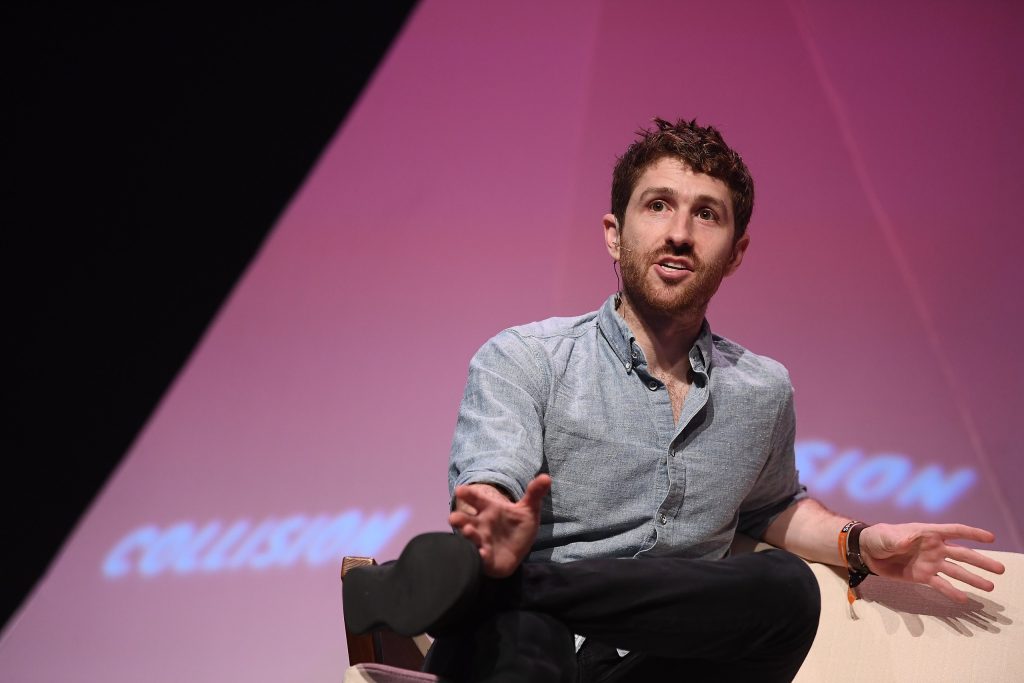
The ethicist who took on big tech
The Center for Humane Technology, co-founded by former Google ethicist Tristan Harris, has been challenging the attention-driven design models of major platforms. Its advocacy, widely recognised through the documentary The Social Dilemma, pushed companies like Apple and Google to introduce features that promote mindful usage and spark a global rethinking of ethical tech design.
Source: Wikimedia Commons
Tech companies should adopt Human-Centred Design principles that remove manipulative features and instead incorporate usage dashboards, mandatory breaks, and notification limits.
CONCLUSION: MOVING TOWARDS A HUMANE DIGITAL FUTURE
The real cost of staying connected goes far beyond electricity bills and the price tags on our devices. It includes environmental degradation, compromised mental well-being, exploitative labour practices, and the erosion of genuine social connections. As we accelerate towards an increasingly digitised future, we must pause and ask: What are we sacrificing in our pursuit of constant connectivity?
Through frugal sustainability, we can reimagine a digitally connected world that uplifts rather than exploits, includes rather than excludes, and empowers rather than consumes. The goal is not to disengage from technology, but to engage with it thoughtfully, placing dignity, responsibility, and sustainability at the core. Reducing the human toll of constant connection is essential. Frugal sustainability also requires rethinking how individuals interact with technology. “Digital minimalism,” proposed by Newport, advocates for the intentional and selective use of digital tools in alignment with human values.17 Frugal innovation offers a compelling response — not by rejecting technology or promoting its unchecked consumption, but by reframing it to operate within ecological limits and in service of human well-being.
By adopting frugal strategies — such as energy-efficient infrastructure, minimalist app design, repairable products, and mindful user engagement — we can build a digital ecosystem that regenerates rather than depletes. After all, the true cost of connection is not measured in gigabytes, but in carbon emissions, lost human potential, and psychological strain. Technology can be intentionally designed to support healthier habits. Apps like Forest, which reward users for staying off their screens, and operating systems with built-in digital well-being tools, demonstrate how frugal thinking can reshape technology to serve human needs — not just corporate profits.
The environmental and psychological costs of hyperconnectivity call for a shift towards more frugal and sustainable digital innovation. By embracing sustainable design principles, promoting ethical labour practices, and prioritising digital well-being, Malaysia can cultivate a more thoughtful and responsible digital landscape. The goal is not to reject technology, but to reassess its purpose, ensuring that progress does not come at the expense of environmental integrity or human dignity. ∞
The true cost of connection is not measured in gigabytes, but in carbon emissions, lost human potential and psychological strain.
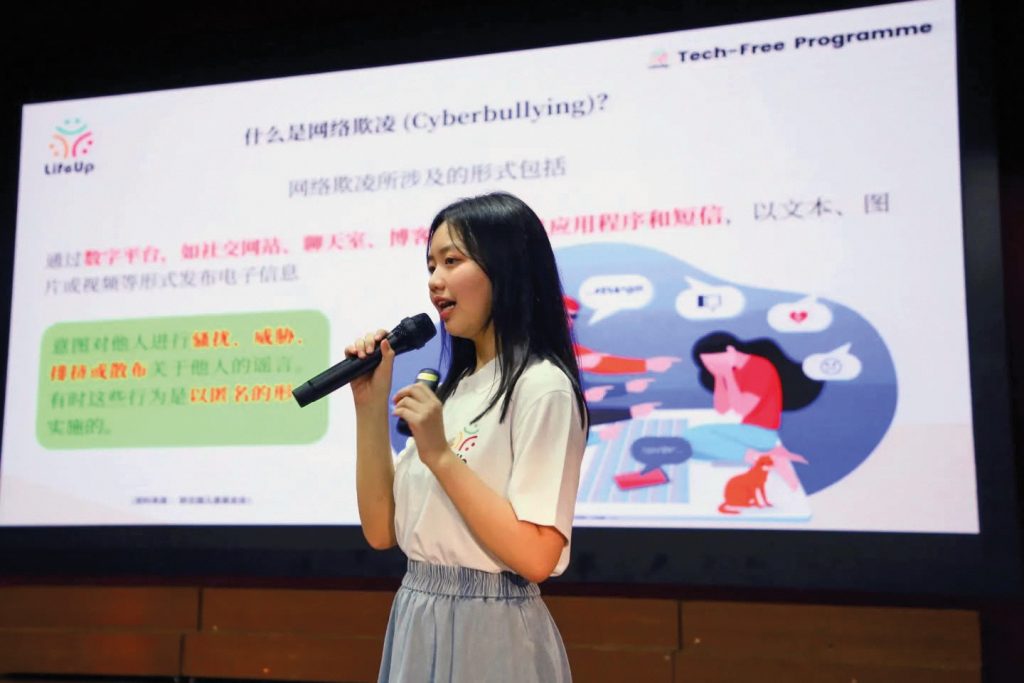
Teen activist pushing for digital detox
A growing youth-led movement is reshaping digital wellness in Malaysia. Leading the way is 18-year-old Liew Li Xuan, co-founder of LifeUp and Youth Ambassador for World Digital Detox Day (WDDD). Drawing from her own struggles with digital overload, she empowers peers through campaigns and workshops to adopt mindful technology use and healthier screen habits.
Source: Facebook @LifeUp Organisation
JAYAMALATHI JAYABALAN
Dr Jayamalathi Jayabalan is an Assistant Professor in the Faculty of Accountancy and Management at Universiti Tunku Abdul Rahman (UTAR). She received a Bachelor of Accounting (Hons) from Universiti Malaya in 1999, a Master of Business Administration from Universiti Utara Malaysia in 2004, and a PhD from Multimedia University in 2023. She teaches management accounting, financial information for decision making, and performance management. Her research interests include frugal innovation, intellectual capital, information technology capabilities, minimum wage in SMEs, disaster risk reduction, and corporate social responsibility. To date, she has built a career spanning over 20 years in both the corporate and academic sectors. Currently, she is a member of the Association of Information Systems (AIS). She has also published in various international journals, book chapters, and conference proceedings, and has presented her work at several international and national conferences.

AUGUST 2025 | ISSUE 14
SCREENS BETWEEN US
- “Data Centres and Energy Consumption.” International Energy Agency (IEA), 2023.
- “The Global E-waste Monitor 2020.” The Global E-Waste Statistics Partnership, 2020, https://globalewaste.org/publications/.
- “Democratic Republic of Congo: ‘This is What We Die For’: Human Rights Abuses in The Democratic Republic of the Congo Power The Global Trade in Cobalt.” Amnesty International, Jan 2016, https://www.amnesty.org/en/documents/afr62/3183/2016/en/.
- Sovacool, Benjamin K, et al. “Sustainable Minerals and Metals for a Low-Carbon Future.” Science, vol 367, no 6473, Jan 2020, pp 30–33, https://doi.org/10.1126/science.aaz6003.
- Banza Lubaba Nkulu, Célestin, et al. “Sustainability of Artisanal Mining of Cobalt in DR Congo”. Nature Sustainability, vol 1, no 9, Sep 2018, pp 495-504, https://doi.org/10.1038/s41893-018-0139-4.
- “A Vision for a Sustainable Battery Value Chain in 2030.” World Economic Forum, 2019, http://www3.weforum.org/docs/WEF_A_Vision_for_a_Sustainable_Battery_Value_Chain_in_2030_Report.pdf.
- Lee, Siew Pien, et al. “Smartphone Use and Addiction Among Secondary School Students in Kuantan, Malaysia.” International Journal of Care Scholars, vol 4, no 1, 2021, pp 36–41.
- Phang, Eyven Yee Man, et al. “A Study of Sleep Quality and Stress on Academic Performance Among Undergraduate Students in Malaysia.” Universiti Tunku Abdul Rahman, 2021, http://eprints.utar.edu.my/4348/1/FYP_PY_EP_2021.pdf.
- “Internet users survey 2020”. Malaysian Communications and Multimedia Commission (MCMC), 2020, https://www.mcmc.gov.my.
- Meri, Aisah, et al. “Patterns of Social Media Usage Among Malaysians During the COVID-19 Pandemic.” Humanities and Social Sciences Letters, vol 10, no 1, 2022, pp 27–35, https://www.researchgate.net/publication/357572760_Patterns_of_Social_Media_Usage_among_Malaysians_During_the_Covid-19_Pandemic.
- Chung, Clarissa. “Teen Suicide Brings Social Media Usage and Mental Health into Sharp Focus”. The Star, 16 May 2019, https://www.thestar.com.my/news/nation/2019/05/16/teen-suicide-brings-social-media-usage-and-mental-health-into-sharp-focus.
- “Internet Users Survey 2022.” Malaysian Communications and Multimedia Commission (MCMC), 2022, https://www.mcmc.gov.my/skmmgovmy/media/General/IUS-2022.pdf.
- “The Global E-waste Monitor 2020.” The Global E-Waste Statistics Partnership, 2020, https://globalewaste.org/publications/.
- “The Global E-waste Monitor 2020.” The Global E-Waste Statistics Partnership, 2020, https://globalewaste.org/publications/.
- “Data Centres and Energy Consumption.” International Energy Agency (IEA), 2023.
- Newport, Cal. Digital Minimalism: Choosing a Focused Life in a Noisy World. Penguin, 2019.
- Newport, Cal. Digital Minimalism: Choosing a Focused Life in a Noisy World. Penguin, 2019.


